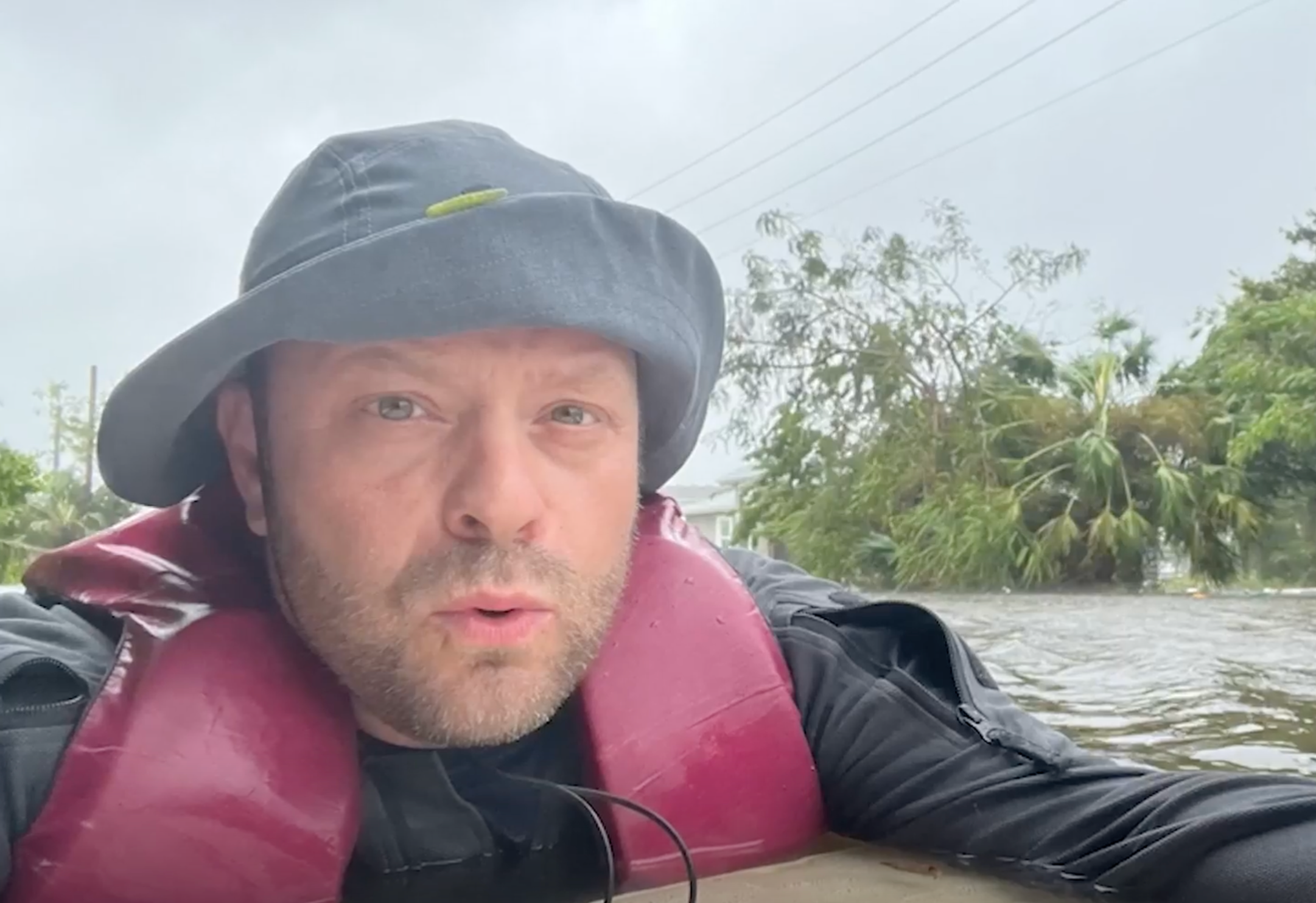
As flooding from Hurricane Ian inundated Naples, Florida, with at least six feet of storm surge, a man was filmed using a wakeboard to paddle across the city and rescue his elderly, disabled mother from water that was nearly up to her face.
Johnny Lauder, a former police officer and trained rescue diver, and his mother hadn’t evacuated before the Category 5 tore across Florida.
"My mom is 84 years old, she’s in a wheelchair, she’s an amputee. She only has one leg and she is stubborn, would be to say it lightly," Mr Lauder told the Weather channel on Tuesday. "She refused to leave. She said she’d fight me kicking or screaming. She wasn’t going to leave the house.”
Waiting out the storm at his son’s house, Mr Lauder watched an estimated three feet of water build up around the doors and windows of the home.

He knew that officials advised against swimming in storm waters, given the risk of sudden changes in the water, contamination, and other dangers, but he was willing to risk it to save his mother.
"So I knew the dangers but you don’t think about that at the time and I just pushed forward," he added in the Weather interview. “Your head’s on a swivel, you’re looking for debris, you’re looking for power lines ...You just don’t think, you do.”
Family members were checking in by phone, and he decided to film brief videos of himself during the rescue to tell them he was okay.
As he tip-toed and swam his way across flooded Naples, Mr Lauder watched as cars floated by, and in the debris he spotted a wakeboard, which he used to paddle to his mother’s house.

There, he found her panicked but alive. After wrapping her in a dry pair of sheets to stave off hypothermia and waiting for the waters to recede, he and one of his sons brought her and another elderly neighbour they encountered to safety. He estimates that if he had arrived 20 or so minutes later, his mother might’ve drowned.
The former officer says the experience showed him to heed official warnings to evacuate.
“I hope if anybody learns anything from this, is that there’s still hope in humanity. But heed the warnings from Mother Nature … We had time to get out … learn from other people’s mistakes," Mr Lauder said. "The next time there’s an evac, we’re gone.”
Mr Lauder’s experience with his mother sadly was a common one. The poor and elderly are most vulnerable during natural disasters, and other residents of Naples described similar rescues.
The city was near where Hurricane Ian first made landfall on mainland Florida.
"(I) Even had a rescue mission to pull an older disabled man through his window, or else I feel like he would have died," artist Nick Rapp, who lives near the water, told the Naples Daily News on Wednesday.
"If I didn’t tie my paddle board up for emergencies. ... if I never would have paddled out to assist people and make sure they were safe to cross, welcome them to our place... and find out about this man trapped in his place ... who knows what his fate would have been," he added.
Another resident, Lacey Swander, told the paper she wasn’t coming back to Florida.
“We are leaving,” the 24-year-old said. “Seeing everything obliterated, it is not OK. I can’t see it anymore.”
It’s been a week since the massive hurricane struck the US. At least 109 people have been confirmed dead, with nearly half of the casualties in Lee County, Florida, home to Ft Myers Beach, just north of Naples. Around 400,000 remain without power.
“When you are walking around the ruins, it’s an apocalyptic scene,” Fort Myers Beach City Councilman Bill Veach told CNN on Tuesday. “You see a friend that you weren’t sure was alive or dead and that brings you joy. A joy that is so much more than the loss of property.”
According to the Florida government, there have been more than 2,300 rescues of trapped residents across the state by more than 1,000 search and rescue personnel, who’ve conducted checks on about 79,000 structures.
President Joe Biden and First Lady Dr Jill Biden visited the Gulf Coast on Wednesday with Florida governor Ron DeSantis.
Touring Ft Myer, the president said the hurricane, as well as wildfires across the West and drought on the Colorado River underscored the urgency of the climate crisis.
“There’s a lot going on and I think the one thing that this has finally ended is the discussion about whether or not there’s climate change and we should do something about it,” Mr Biden said.





